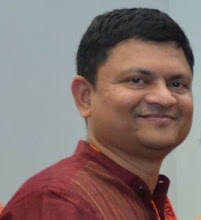'Thou shalt not' might reach the head, but it takes 'Once upon a time' to reach the heart.
-Philip Pullman, author of 'His Dark Materials'
The statement above is quoted in an excellent New Yorker article[1] on Philip Pullman, winner of various awards for his "His Dark Materials" trilogy. The statement appears in a slightly different form in the talk he gave while receiving the Carnegie medal[2]: Thou shalt not is soon forgotten, but Once upon a time lasts forever.
Philip is a great patron of morals, but he believes not in preaching them, but observing them, soaking them in and practicing them. Hence he believes that you can make rules and make children (or even adults) learn them, but if you tell those through a story, they are better understood. Mind you, he is not talking about stories that come with some moral as a tail-piece. Those are the worst kind (J H Frere illustrates this wonderfully in his poem "A Fable"[3]) - the morals have to implicitly come through examples/stories seen/heard.
Indian literature is full of fables where often a stereotype is pushed down the ears and eyes of all children and it is expected that they lead their lives like that. Experimentation and breaking of norms is not encouraged. Duty and obedience are the keywords. Children are brought up on Aesop's fables and panchatantra and kauche ghar sheNaache. No latitude in learning is taught.
In Pullman's trilogy the church and Christianity are described as a powerful and convincing mistake. In an interview Pullman said: "every single religion that has a monotheistic god ends up by persecuting other people and killing them because they don't accept him." He likens monotheistic religions to power seeking groups like the secret police. I like the Hindu philosophy better than most world religions. But I am afraid for the world when in the name of religion even these polytheists start acting like every other religion and calling everyone else communists.
At a recent talk Stephen Hawking asked a question in serious earnestness. Brilliant as he is, I do not like to go to his talks as due to his disability, he can not cover much. Due to the same disability he can not hit back when he is not understood properly. Due to their preconceived notions, much of the Christians in the audience took his question as a joke and laughed. He has been working on the origin of the universe and that of space-time. For convenience, he labeled as God whatever could have existed before the existence of time and asked what was God doing before he created space and time? Creating Hell for people who ask such questions? Indeed, to many the question itself is blasphemous and has to be discouraged. Why? That is another question to be discouraged. And so on.
One way to break out of this is to tell stories, image scenarios, and not attach morals to them. Imagine and let imagine.
Do not let others define your morals for you. Look around and you will be able to define them for yourself.
[1] Far from Narnia
[2] Carnegie medal acceptance speech
[3] A Fable
BTW, movies are being made on all three of his books in the trilogy: The Golden Compass, The Subtle Knife, and The Amber Spyglass. I look forward to them. Until then, do read the books. They are wonderful.
Saturday, October 07, 2006
Subscribe to:
Post Comments (Atom)




No comments:
Post a Comment